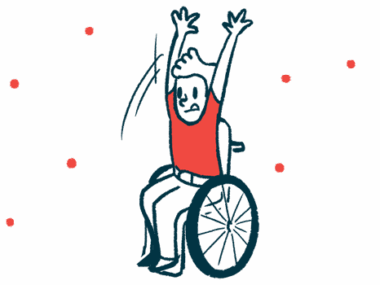Pregnancies reported for partners of 3 late-onset SMA men on Evrysdi
Case series show 'sufficient sperm production' for males on approved therapy
Written by |

Three men with late-onset spinal muscular atrophy (SMA) undergoing treatment with the approved therapy Evrysdi (risdiplam) were able to conceive with their partners, a case series reported.
None of the pregnancies were planned, and the researchers noted there were no missed treatment doses. Among the three, one pregnancy was voluntarily terminated, while the other two men’s partners gave birth to healthy babies.
“This series presents three cases of successful conception while a male patient was receiving [Evrysid],” the researchers wrote. “This case series demonstrates that there was sufficient sperm production while on [Evrysdi] to result in pregnancy.”
Given the scant knowledge in this area, the team noted that “more research is needed to provide a complete understanding of the effects of [Evrysdi] on male fertility in humans.”
The men’s experiences were detailed in a study, titled “Fertility Outcomes in Risdiplam-Treated Male Patients with Spinal Muscular Atrophy: A Multicenter Case Series,” which was published in the journal Advances in Therapy. The study was funded by Genentech, a subsidiary of Roche, which markets Evrysdi.
‘First known cases’ of conception involving men on Evrysdi: Study
Evrysdi is a widely available, disease-modifying therapy approved for children and adults with SMA. Taken orally or via a feeding tube, it’s designed to boost the levels of SMN, the protein that’s deficient in people with the rare genetic condition.
According to a review of multiple preclinical safety studies, high doses of Evrysdi affected the development of sperm in rats and monkeys, which was reversed when the drug was stopped. Still, the doses given to the animals were higher than those approved for SMA patients.
These findings prompted researchers in the U.S. and Austria to examine the real-world outcomes of three men with SMA who received Evrysdi treatment (5 mg once daily) and conceived with their partners.
“This report presents the first known cases of conception while a male patient was receiving [Evrysdi] or any approved disease-modifying therapy for SMA,” the researchers wrote, noting the “limited human reproduction data in men with SMA.”
The researchers further noted that, among these three men, “there was no intention to conceive with their partners.”
One of the men was 34 and had started having walking difficulty at age 8. After challenges with school sports, he was diagnosed with SMA at 15 via genetic testing; the clinical course was consistent with SMA type 3.
At age 32, the patient began Evrysdi treatment. Over 30 months, or 2.5 years, his motor function remained stable, and his breathing, swallowing, and speech were normal. Although his partner had lipedema, an abnormal fat buildup in the lower body, she was otherwise healthy and taking oral contraceptives.
She conceived while the man was on Evrysdi, which resulted in the birth of a healthy boy. At birth, the baby was small in height and weight, but at 3.5 months, he was developing normally.
The man had been aware that he might never have children of his own. Still, treatment with Evrysdi allowed him to remain mobile, eased his fatigue, and enabled him to pursue a career and start a family.
Researchers call for study of effects of treatment on male fertility
The second patient was a 28-year-old man who experienced an abnormal gait and frequent falls at about age 2. At 13, he was diagnosed with SMA via genetic testing, with a clinical course of SMA type 3.
His motor function was not measured before starting Evrysdi in 2021. After two years of treatment, his scores on two scales that evaluate motor function indicated moderate motor function and some ability to use his arms but with limitations. His swallowing and speech were normal.
Although he was hospitalized for gastrointestinal side effects related to Evrysdi, treatment was resumed after these events were resolved.
He and his partner were not using contraception because they believed they were infertile due to the partner’s polycystic ovary syndrome, a hormone imbalance characterized by irregular periods, excess male hormones, and cysts on the ovaries. Regardless, in 2022, she conceived and gave birth to a healthy girl who developed normally.
Continuing research is needed to provide a complete understanding of the effects of [Evrysdi] on male fertility in humans given that availability of SMA treatment has allowed patients the opportunity for family planning.
The third case involved a 21-year-old man who was diagnosed with SMA type 4 at 16 years of age via genetic testing. He began treatment with Spinraza (nusinersen), another approved SMA treatment, but stopped due to nausea and back pain and switched to Evrysdi.
After 21 months of treatment, his motor and breathing functions improved, but he experienced chronic, but minimally bothersome, diarrhea as a side effect. His partner was healthy with no fertility concerns. Although he used condoms, they accidentally conceived, but the pregnancy was voluntarily terminated.
He remained stable on Evrysdi, but due to persistent weakness, he faced challenges with workplace opportunities.
The man was motivated to understand the impact that treatment had on fertility because of his desire to have children in the future.
Overall, the researchers noted that the study was limited by its small size. Further, these results may not fully reflect the SMA population, the team noted.
Nonetheless, the team concluded that “adult male patients with SMA who are on treatment with [Evrysdi] have been able to conceive with their partners.”
“Continuing research is needed to provide a complete understanding of the effects of [Evrysdi] on male fertility in humans given that availability of SMA treatment has allowed patients the opportunity for family planning,” the researchers wrote.





